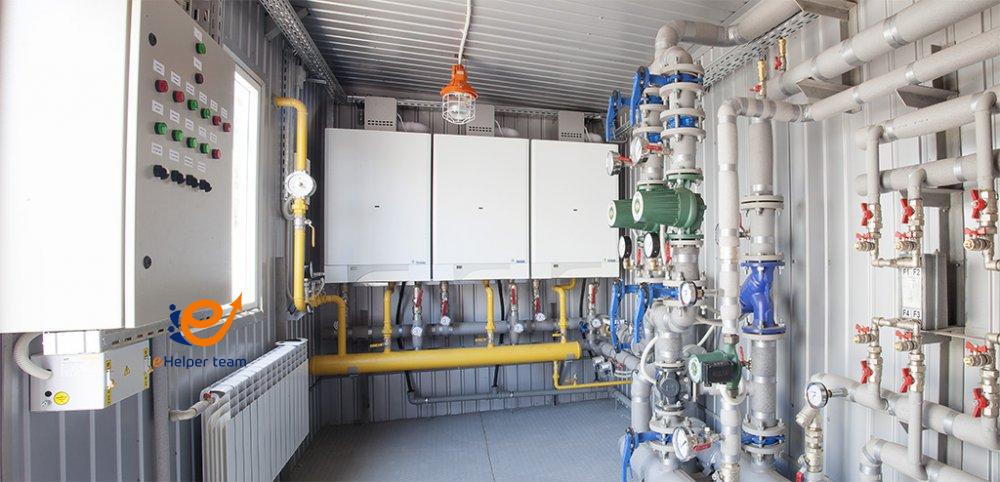Modular Boiler Rooms: A Comprehensive Guide
In the realm of heating and hot water supply systems, modular boiler rooms have emerged as a game-changer, offering a plethora of advantages over traditional boiler setups. These pre-engineered and pre-assembled units are renowned for their versatility, efficiency, and ease of installation, making them a preferred choice for a wide range of applications.

What are Modular Boiler Rooms?
Modular boiler rooms, also known as packaged boiler systems, are essentially self-contained units that house all the necessary components for heating and hot water generation within a compact enclosure. These components typically include boilers, pumps, heat exchangers, controls, and safety systems, all neatly integrated into a modular structure.
What are modular boiler rooms?
Modular boiler rooms are pre-assembled and pre-engineered heating and hot water systems that are housed in a compact enclosure. They are becoming increasingly popular because they are efficient, easy to install, and can be customized to meet the specific needs of a building.
Benefits of modular boiler rooms
- Efficiency: Modular boiler rooms are designed to be very efficient, which can save you money on your energy bills.
- Ease of installation: Modular boiler rooms are pre-assembled, which makes them easy to install. This can save you time and money on the installation process.
- Customization: Modular boiler rooms can be customized to meet the specific needs of your building. This means that you can get a system that is the perfect size for your building and that meets your specific heating and hot water needs.
How to use the keyword “manufacturer of modular boiler rooms” in your writing
- Use the keyword in the title of your article. This will help people find your article when they are searching for information about modular boiler rooms.
- Use the keyword throughout your article. This will help to ensure that your article is relevant to the keyword and that it will be found by people who are searching for information about modular boiler rooms.
- Use the keyword in a natural way. Don’t just stuff it into your article in a way that sounds unnatural. Use it in a way that makes sense and that flows with the rest of your writing.
Here are some examples of how to use the keyword “manufacturer of modular boiler rooms” in your writing:
- “Modular boiler rooms are a great option for businesses and homeowners who are looking for an efficient, easy-to-install, and customizable heating and hot water system. There are many different manufacturers of modular boiler rooms on the market, so it is important to do your research to find the right one for your needs.”
- “When choosing a manufacturer of modular boiler rooms, it is important to consider factors such as the efficiency of the system, the ease of installation, and the warranty. You should also make sure that the manufacturer has a good reputation and that they offer customer support.”
- “Modular boiler rooms can be a great way to save money on your energy bills. If you are considering installing a modular boiler room in your home or business, be sure to get quotes from several different manufacturers.”
Key Advantages of Modular Boiler Rooms
Versatility: Modular boiler rooms are designed to cater to a diverse range of heating and hot water needs, from small residential buildings to large industrial facilities. Their modular nature allows for customization to meet specific capacity and fuel requirements.
Efficiency: Modular boiler rooms are engineered to optimize fuel consumption and minimize energy losses, resulting in significant cost savings. Their compact design and advanced control systems contribute to their exceptional energy efficiency.
Ease of Installation: Unlike traditional boiler systems that require extensive on-site assembly, modular boiler rooms arrive pre-assembled and factory-tested, significantly reducing installation time and costs. This streamlined process minimizes disruption to existing operations.
Compact Footprint: Modular boiler rooms are designed to occupy minimal space, making them ideal for applications where space is a constraint. Their compact size allows for installation in various locations, including rooftops, basements, and even outdoor areas.
Scalability: Modular boiler rooms can be easily expanded or modified to accommodate changing heating and hot water demands. This scalability ensures that the system can grow alongside the facility’s needs.
Environmental Friendliness: Modular boiler rooms are designed to minimize environmental impact by incorporating low-emission technologies and efficient combustion processes. They contribute to cleaner air quality and reduce greenhouse gas emissions.
Applications of Modular Boiler Rooms
Modular boiler rooms have found widespread application in various sectors, including:
Residential Buildings: Apartments, condominiums, and multi-family dwellings often utilize modular boiler rooms for their efficient and space-saving heating and hot water needs.
Commercial Buildings: Office buildings, retail spaces, and hotels commonly employ modular boiler rooms due to their versatility and ability to meet diverse heating and hot water demands.
Industrial Facilities: Manufacturing plants, warehouses, and factories often rely on modular boiler rooms for their high-capacity heating and hot water requirements.
Educational Institutions: Schools, universities, and research facilities frequently utilize modular boiler rooms to provide efficient and reliable heating and hot water systems.
Healthcare Facilities: Hospitals, clinics, and nursing homes often employ modular boiler rooms to meet their stringent demands for continuous and reliable heating and hot water supply.
Mobile Boiler Rooms: Heating on the Go
Mobile boiler rooms, also known as transportable boiler rooms, are a specialized type of modular boiler room designed for temporary or emergency heating and hot water applications. These units are mounted on trailers or skids, making them easily transportable from one location to another.
Key Features of Mobile Boiler Rooms:
Portability: Mobile boiler rooms are designed for quick deployment and relocation, making them ideal for temporary heating and hot water needs in disaster relief, construction sites, and remote locations.
Self-Sufficiency: Mobile boiler rooms are self-contained units with integrated fuel tanks, power generators, and control systems, ensuring operation even in areas with limited infrastructure.
Rapid Deployment: Mobile boiler rooms can be quickly set up and operational within a short timeframe, providing immediate heating and hot water solutions in emergency situations.
Durability: Mobile boiler rooms are constructed with robust materials and components to withstand harsh weather conditions and demanding environments.
Applications of Mobile Boiler Rooms
Disaster Relief: Mobile boiler rooms play a crucial role in disaster relief efforts, providing temporary heating and hot water to affected communities in the aftermath of natural disasters.
Construction Sites: Mobile boiler rooms are commonly used on construction sites to provide heating and hot water for workers and to protect temperature-sensitive materials.
Remote Locations: Mobile boiler rooms are employed in remote areas where permanent heating and hot water infrastructure is unavailable, such as mining camps and oil rigs.
Special Events: Mobile boiler rooms can be used to provide temporary heating and hot water for outdoor events, festivals, and sporting competitions.
Military Applications: Mobile boiler rooms are utilized by military forces to provide heating and hot water in field camps and temporary bases.
BayWa and Ampt Achieve First-of-its-Kind Solar Integration in Wind-Flow Battery Project
German renewable energy developer BayWa re and US-based DC optimizer producer Ampt collaborated with the Fraunhofer Institute for Chemical Technology (ICT) on a groundbreaking project in Pfinztal, Germany. This project integrates solar power into a wind-flow battery system, marking a significant innovation in renewable energy solutions.
Traditionally, solar panels require dedicated inverters to convert the direct current (DC) electricity they produce into alternating current (AC) electricity compatible with the power grid. However, this project eliminates the need for separate inverters for the solar panels.
Here’s what makes this project unique:
- Hybrid System: It combines 690 kW of rooftop and ground-mounted solar photovoltaic (PV) systems with a 2 MW wind turbine and a 10 MWh flow battery energy storage system, creating a diverse and powerful renewable energy source.
- DC Coupling: Ampt’s DC optimizers play a key role. These optimizers allow the DC electricity from the solar panels to be directly integrated with the DC output of the wind turbine. This combined DC output then feeds the flow battery for storage or directly into the power grid through the existing inverter connected to the wind turbine.
Benefits of DC Coupling:
- Efficiency Gains: Eliminating dedicated solar inverters reduces energy losses associated with the DC-to-AC and AC-to-DC conversion processes, resulting in a more efficient system.
- Simplified Installation: By removing the need for additional inverters, the system becomes more streamlined and easier to install.
- Cost Reduction: The absence of dedicated solar inverters translates to lower overall project costs.
Overall Significance:
This project demonstrates a novel approach to integrating solar power into wind-flow battery systems. The use of DC optimizers for direct current coupling opens doors for more efficient and cost-effective renewable energy solutions in the future.
Note: While no specific sources were mentioned, you can find more information about this project by searching for “BayWa Ampt flow battery project” or similar terms.
Conclusion
Modular boiler rooms and mobile boiler rooms have revolutionized the heating and hot water supply landscape, offering a multitude of advantages over traditional systems. Their versatility, efficiency, ease of installation, and compact footprint





